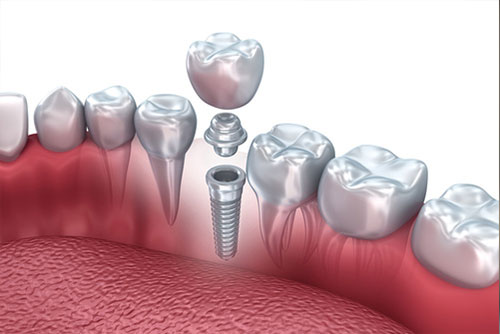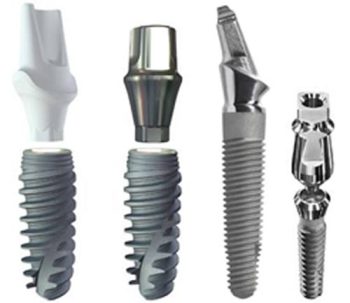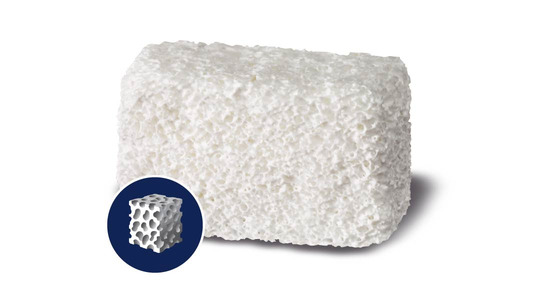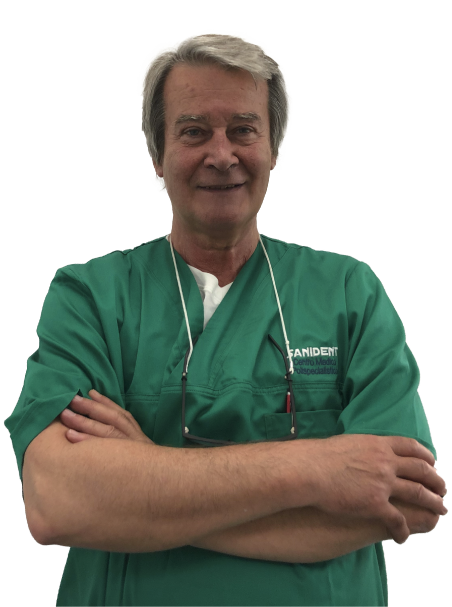
Dental implants are titanium screws that are inserted into the jaw bone to replace the root of the missing tooth.
Single crowns, bridges or complete dentures can be attached to these screws, completely restoring the aesthetics and functionality of your smile.
Sanident uses premium-price dental implants of the highest quality certified with a lifetime international guarantee from the world leaders in implantology:


For bone regeneration Sanident uses only Swiss products from Geistlich Pharma AG ®, world leader in biocompatible regenerative materials – (BioOss ® and BioGide ®)
The surgeons of the Sanident dental clinic and multi-specialist medical center have all obtained Master’s degrees and specific training for implantology and periodontology in collaboration with New York University – International Post Graduate Program of Periodontology and Implant Dentistry.

Contact us and book a free initial consultation now.
Learn more about the topic by reading our articles.
Dental implantology means, in the absence of one or more teeth, the insertion of one or more titanium screws into the maxillary or mandibular bone. Once one of the Sanident dentists in our dental clinics has verified the so-called osseointegration, he will be able to support an artificial tooth suitable to perform the function of the missing natural teeth.
If the market can currently be divided into low cost dental implants and premium prices, it is important to understand that only this last type offers guarantees to the patient. This is because quality dental implant products are the only ones supported by adequate scientific evidence and clinical trials; low-cost implants, on the other hand, can be marketed at lower prices because they don’t meet these requirements, often exploiting expired patents of larger companies and copying them more or less slavishly, creating true clones beyond any control. To lose, obviously, is always the health of patients.
According to a clinical study published in the Clinical Implant Dentistry and Related Research, only a few brands of implants have been tested by at least two independent (non-sponsored) clinical works, which should prompt patients to request more transparency before accepting any estimate, up to the release of a real implant passport. Among the brands of implants included and mentioned in this clinical study are: Aiser ® Straumann ®, Nobel Biocare ®, Dentsply Implants ®”
A dental implant is a screw constructed using specific nanometric technology and is designed to replace the natural root of a human tooth.
Modern titanium abutments are mostly cylindrical in shape and vary in length and diameter to adapt to the varying morphology of the bone profile where they are inserted.
Titanium structures are used in all surgeries, not just oral surgery, due to their complete tolerability.
As with any other product, there are differences in the quality of the materials used to make the implants and the technology used by the implant manufacturers for their design and manufacturing, and above all, in the quality and quantity of scientific testing conducted before and after their release.
All of this also affects their cost. It is very important to get advice from the implantologist on the characteristics of each model that can be applied to your case and also talk about the structures that will be placed on the implant for rehabilitation, thus also having a clear picture of the possibility of replacing the prostheses over time.
After the surgical intervention which allowed the positioning of the implant in the site to be rehabilitated, a physiological wait of approximately 3/4 months is necessary during which the organism naturally proceeds to the osteointegration of the screw (along the threads of the screw of the dental implant inserted into the bone, the cells present called osteoblasts create filaments all around it and bind to the implant, integrating it and fixing it completely to the bone).
Subsequently, with the aid of a radiological examination, usually a digital panoramic x-ray or, if further detail is needed, a 3D Cone Beam CT scan, we assess whether the implant has integrated perfectly with the bone.
At this point, we can proceed to the uncovering phase and application of the healing abutments, mounted on the internal thread of the dental implant and necessary to correctly shape the gum.
After about a week, an impression of the implants can be taken (in Sanident
the innovative three-dimensional digital scanning technique is used for improved precision compared to the traditional impression with silicone materials).
From the digital impression obtained, the project of the optimal prosthetic structure in terms of functionality and aesthetics is created on the computer with the aid of CAD/CAM technology and is subsequently created by milling biomedical resin for the temporary provision and very pure blocks of ceramic and/or zirconia for the definitive. If the patient’s clinical and anatomical conditions allow it, it is also possible to perform immediate loading implantology with fixed ceramic composite teeth already placed at the end of the surgical session or within 72 hours of surgery.
The crowns and bridges used by Sanident are manufactured in a highly specialized laboratory owned by Sanident using modern CAD/CAM technology. With the help of specialized technicians, high-definition Zeiss microscopes, digital scanners, powerful computers, and 5-axis milling machines, Sanident achieves unprecedented precision in the production of fixed prosthetics that were previously handcrafted.
The materials used are blocks of the purest ceramic and zirconium oxide, extremely aesthetic and durable, and free of metal alloys previously used for fabrication using the old metal casting process.
Yes, regardless of the type of prosthesis placed on the implants, you will be able to eat and speak normally, just like with natural teeth.
In fact, the dental implant replaces the natural root of the tooth, and the crown placed over the implant replaces the natural tooth itself.
No difference is noted. It seems to have natural teeth.
If the doctor determines an optimal clinical and anatomical situation, “immediate implant loading” is possible. This involves attaching a high-quality temporary restoration directly to the newly placed implant, rather than waiting for the implant to integrate into the bone.
This new technique allows for permanent teeth to be achieved on the same day as the implant placement.
In cases of autoimmune diseases that preclude other types of intervention, or in the presence of serious generalized diseases such as significant heart disease, high-grade diabetes, severe blood clotting problems, or a severely compromised immune system, implant placement is not recommended.
In these cases, the implantologist should be informed, who, in consultation with the Sanident team of doctors and specialists, will recommend alternative treatment options.
You never remain without teeth. A comfortable, removable temporary denture made of biomedical resin is created for one or more missing teeth and applied immediately after implant placement.
This temporary denture is subsequently replaced with a fixed ceramic tooth once the dental implant is osseointegrated.
In the case of immediate-load full-arch implant rehabilitation, if the patient’s bone is sufficiently large and of good quality, thanks to the modern techniques and latest-generation implants used by Sanident doctors, permanent fixed teeth can be achieved immediately.
Dental implants can be placed immediately after extraction (post-extraction dental implants), but it is very important to verify that the extracted teeth have not been infected.
The socket receiving the implant must be intact to avoid the possibility of infection and therefore the possibility of dental implant failure.
If necessary, Sanident uses synthetic bone derived from bovine bone matrix to replace lost bone tissue.
General anesthesia is not necessary for the insertion of dental implants.
Local anesthesia or in some cases conscious sedation administered to the patient by an anesthetist specialist who is always present at Sanident during all Dental Implantology and Zygomatic Dental Implantology procedures is sufficient.
Dental implants can last a very long time, even a lifetime.
It is very important to take the utmost care during the osseointegration period of the dental implant and to subsequently practice meticulous daily hygiene at home and periodically at Sanident. Thanks to its partnership with the world’s leading implant manufacturers, Sanident guarantees dental implants for life against any possible manufacturing defects.
Dental implants, like all other prosthetics and artificial supports used in modern medicine for insertion into the human body, are made of titanium.
Titanium is a strong and lightweight material that has no allergenic components and is accepted by the body as an integral part of itself.
Before proceeding with the surgical procedure for placing dental implants, bone formation and growth must be complete.
For this reason, dental implant placement is not recommended before the age of 18.
The maximum age is determined by an objective analysis of the patient’s general health and the presence of sufficient bone support for the placement of dental implants.
It is necessary to avoid intense sporting activities and sustained efforts as there is (albeit minimal) a wound that is in the process of healing. Light activities do not involve any risk or contraindication.
Dental implants are not magnetic and cannot cause reactions in safety detectors.
Having no electromagnetic effect, dental implants do not pose a danger to the correct functioning of pacemakers.
Below we indicate a combination at the top of the Sanident range of excellence for implantology with all the steps necessary for the intervention and therapy:
To address this problem, the alveolar bone volume must be increased.
These bone grafts can be performed either simultaneously with the implant procedure or before it; the Sanident surgeon will determine which procedure is most appropriate for the patient.
Autologous bone grafting, i.e., the patient’s own bone harvested from other sites and placed at the site of surgery, is a technique used to increase bone thickness.
Another method involves filling the defect with synthetic granular bone covered by a biocompatible, resorbable membrane.
The maxillary sinus frequently has a reduced vertical bone thickness that prevents stable implant anchoring.
Maxillary sinus lift, or major maxillary sinus lift, is a specialized bone grafting technique: during the procedure, the maxillary sinus floor is exposed and the lining membrane is lifted using a sophisticated MECTRON piezosurgery device; the space is filled with autologous bone chips and/or artificial bone synthesized from bovine bone matrix.
After approximately 4-6 months, the autologous bone graft will have completed the bone regeneration process.
Even with the use of synthetic bone substitute materials used to fill defects resulting from bone deficiency, the bone substitute will be invaded and replaced by the patient’s natural bone within approximately 4-6 months.
Thanks to the modern implantology techniques practiced in Sanident by a team of excellent specialists, with bone regeneration we are able to stimulate the physiological process of bone remodeling and growth, using clinically tested intervention protocols.
The first technique is linked to bone auto-transplantation: the bone is taken from another part of the body (from the chin or head) and grafted into the gum. You are not exposed to the risk of rejection as the bone taken is from the same patient.
In the second type of technique for bone regeneration, artificial bone made of synthetic material is used; this material, installed in the gum and covered by a resorbable membrane, melts into the bone.
Also this intervention does not expose to the risk of rejection, being the synthetic material and biocompatible.
The fear of the dentist or rather the fear of undergoing treatment due to pain is a constant subject of research at Sanident and we can confidently state that at Sanident the fear vanishes from the first session.
We pay close attention to understanding the patient’s state of mind, aware that pain thresholds and perceived discomfort are highly individual factors. Consequently, we strive to provide each patient with the necessary attention to permanently eliminate even the slightest sensation of pain or discomfort.
Thanks to the pain prevention and control technique practiced by our expert anesthetists, every operation is peaceful and all patients are satisfied with the surgery assisted with oxygen therapy, anxiolysis and conscious sedation without feeling any pain.
Comfortable environments, relaxing videos and music, attentive and caring staff, anesthetic sprays, painless needles, oxygen therapy, local anesthesia, conscious sedation, and anxiolysis: we use these and other proven techniques every day, supported by state-of-the-art instruments, electronic equipment, and specific medications.
For the most serious cases, we collaborate with expert anesthesiologists and resuscitation specialists, performing conscious sedation or anxiolysis.
The results achieved with this technique are exceptional: patients undergo treatment with complete peace of mind, and procedures are conducted more smoothly and take less time overall.
Post-procedure symptoms are also reduced in intensity and duration. The reassured patient acquires confidence and undergoes any subsequent sessions provided without any fear.
In all treatments and areas of intervention, from a simple dental hygiene session for teeth cleaning to immediate-load implant procedures where the patient enters the operating room in a single session edentulous or with compromised natural teeth and leaves with implants in place and fixed prosthetics on both arches, Sanident and its entire staff are constantly committed to completely eliminating pain and the resulting fear of the dentist.
While maintaining the uncompromising standards of excellence and quality of its treatments and products, Sanident has always fought an ongoing battle to reduce the prices of the treatments it offers its patients, and in some cases has even eliminated them altogether (see free check-ups or affordable dental hygiene boosters as part of its prevention and follow-up program for existing patients).
Thanks to the commitment of SANIDENT, its partners, and the large numbers achieved (more than 10,000 patients treated in the last six years), we can now offer high-end titanium dental implants at prices under €1,200 (the cost of the titanium screw alone and the specialist implant surgeon’s intervention) and at affordable prices, including payment by installments.
The international guarantee with personal certificate offered on the implants used by Sanident offers exclusive international lifetime coverage for any type of high-end implant chosen.
Sanident guarantees the success of this modern technology by making use of the collaboration of internationally renowned dentists specialized in implantology and regenerative surgery (the team that has more than 1,500 installations per year It is composed of only specialist implantologists registered with the order of doctors and dentists with specific Master’s degrees obtained at important national and international university institutes such as New York University, the University of Geneva and largely already university professors and speakers of courses and conferences on implantology and regenerative surgery) , selecting the high quality of the materials used (only first-class systems Aiser, Straumann, Nobel, Dentsply) and practicing implantology safe from any possible source of pathogenic infection using cutting-edge sterilization procedures and sterile components and equipment in dedicated surgical room inside the exclusive facility reserved only for dental implant and bone regeneration procedures.
We’ve tried to list all our strengths because we’re the first point of contact for
implantology.
On the side of those who ask:
How to choose the right clinic?
What should I ask when they give me a quote?
Dental implant placement is a major surgical procedure.
The choice of materials, equipment, surgeon and team performing the procedure, and the facility where the patient will undergo surgery are all factors that determine the success or failure of the procedure. The goal is to achieve immediate and long-term success!
It must always be taken into consideration that for a perfect success of the treatment it is necessary to provide for various follow-up visits following the intervention (even if it is an immediate load), therefore, we can suggest, so as possible, to contact an easily accessible structure or well connected that is a guarantee of reliability and presence even in the medium and long term for any expected or unexpected future needs.
It’s important to take the time to carefully evaluate the many options available on the market today.
The most important questions to ask yourself when evaluating a dental clinic and a quote are:
In general:
In detail:
In summary:

The Clinics of Excellence for Oral Surgery and Implantology.
Sanident srl – P. I. 06696930962
Copyright © 2026. All Right Reserved.